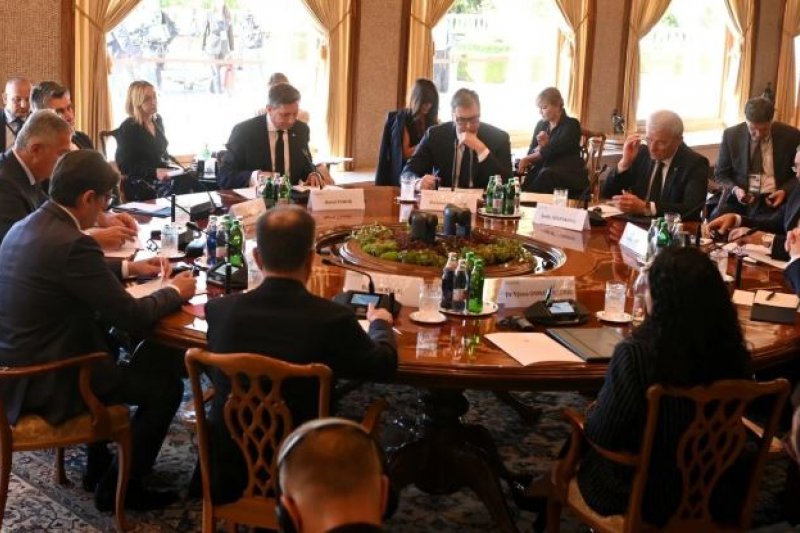Brdo-Brijuni Summit Urges EU to Remove Visas with Kosovo
President of Slovenia, Borut Pahor, called on the European Union to offer Kosovo visa liberalization, while Bosnia and Herzegovina the status of a candidate state until the end of 2022.
Pahor made the comments at the end of the Brdo-Brijuni Process summit, which was held on Monday in Bërdo, Slovenia. This call, he said, is also part of the conclusions that were approved after the summit.
The president of Kosovo, Vjosa Osmani, the president of Albania, Bajram Begaj, the president of Serbia, Aleksandar Vu?i?, the president of Montenegro, Milo Djukanovi?, the president of North Macedonia, Stevo Pendarovski, the president of Croatia, Zoran Millanovi, as well as the members of the tripartite presidency of Bosnia, Sefik Xhaferovi, Milorad Dodik and Zhelko Komši, also participated in the Summit.
Pahor said that it has been agreed with the leaders of the countries of the region that talks are the only way to solve open issues.
"The summit was successfully concluded for two reasons: the discussions were quite good and we insisted on being more united. There are some things that divide us, but we have to understand where these differences are", declared Pahor, not giving many details, but saying that the trust between the countries is not at the highest possible level.
President of Kosovo, Vjosa Osmani, said that the call for the liberalization of visas for Kosovo was approved unanimously in the Bërdo-Brioni Process. She said that during this year, she expects the EU to make a decision on this issue, as she added that there is support among the bloc.
"Currently, there is no country in the EU that tells us that they are against the liberalization of visas, and I believe that we have the best momentum in the last four years. So the momentum is great, we have the support of the country that is hosting this meeting [of the EU Council held in the Czech Republic] and the ministerial meetings. We hope that there will be a visa working group meeting in October to push the issue forward. And then at the new EU-Western Balkan summit, which is expected to be held later, after October. What is important is that this decision is taken during the Czech Presidency, that is, during this year", said Osmani.
Meanwhile, in the approved conclusions, the importance of EU expansion with the remaining countries of the Western Balkans is emphasized. This process is considered as "the most direct contribution to maintaining peace and stability in the region".
"We call on the EU to stand by the side of the Western Balkans, in order to mitigate the consequences of the economic and energy crisis. We confirm our commitment to dialogue - as the only way to overcome differences", it is also stated in the conclusions.
Meanwhile, the president of Serbia, Aleksandar Vucic, stated that the European Union is not popular among the citizens of Serbia, but said he hopes that this will change in the future.
"I come from a country that is on the European road, I don't want to give it up, but in which the EU is the least popular. If you had a referendum in Serbia today, on the question: Do you want to enter the EU or not, the citizens of Serbia would say no", said Vu?i? after the summit of the Bërdo Brioni Process.
He also said that he hopes that this will change "in the coming months or years".
He added that one of the main reasons for this is the issue of territorial integrity of Serbia. Serbia considers that with the independence of Kosovo, announced in 2008, its territorial integrity has been violated. However, the International Court of Justice concluded in 2010 that Kosovo's independence does not conflict with international law.
On the other hand, the president of Croatia, Zoran Milanovi?, said that at the meeting of the Bërdo Brioni Process, there was no discussion about the dialogue between Kosovo and Serbia, which aims to normalize relations between these two countries.
"I support the recognition of Kosovo. All the countries that have not done this should do it, but this [summit] was not the case for it", said Millanovi?.
He also said that he will do everything possible for the Bërdo-Brioni Process to continue, as Pahor completes his second presidential term this year.
The Bërdo-Brion process is a Slovenian-Croatian initiative, undertaken in 2010 by Pahor, then prime minister of Slovenia.
Its purpose is to strengthen mutual trust in the Western Balkans, regional cooperation and faster integration of this region into the EU.
Where are the Balkan countries on the road to the EU?
In a summit held in 2003 in Thessaloniki, Greece, the EU member states adopted a joint statement, where they expressed their support for the European perspective of the Western Balkan countries.
"The future of the Balkans is within the EU", they said.
Since then, only Croatia, from the countries of the region, has joined the EU, in 2013.
Montenegro and Serbia have started membership negotiations, while in July also North Macedonia and Albania.
Kosovo and Bosnia and Herzegovina only have a Stabilization-Association Agreement with the EU, which is the first step towards membership in the bloc. Kosovo is also the only country in the Western Balkans that does not have visa liberalization with the EU. Although the European Commission has confirmed that it has met the conditions, some countries, such as France and the Netherlands, express reservations about the free movement of Kosovars.














